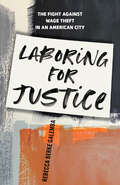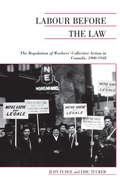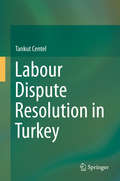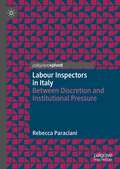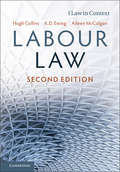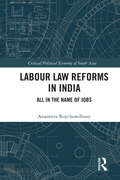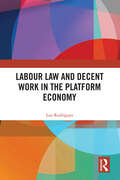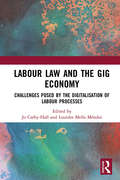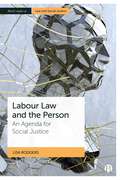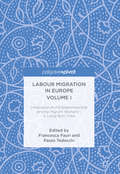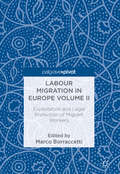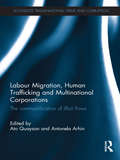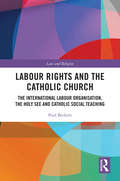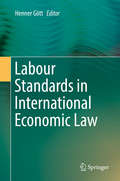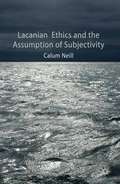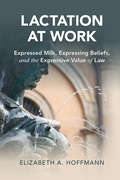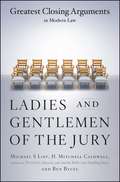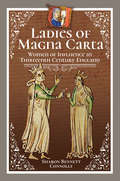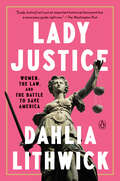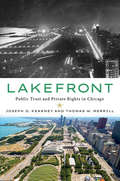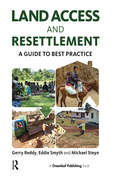- Table View
- List View
Laboring for Justice: The Fight Against Wage Theft in an American City
by Rebecca Berke GalembaLaboring for Justice highlights the experiences of day laborers and advocates in the struggle against wage theft in Denver, Colorado. Drawing on more than seven years of research that earned special recognition for its community engagement, this book analyzes the widespread problem of wage theft and its disproportionate impact on low-wage immigrant workers. Rebecca Galemba focuses on the plight of day laborers in Denver, Colorado—a quintessential purple state that has swung between some of the harshest and more welcoming policies around immigrant and labor rights. With collaborators and community partners, Galemba reveals how labor abuses like wage theft persist, and how advocates, attorneys, and workers struggle to redress and prevent those abuses using proactive policy, legal challenges, and direct action tactics. As more and more industries move away from secure, permanent employment and towards casualized labor practices, this book shines a light on wage theft as symptomatic of larger, systemic issues throughout the U.S. economy, and illustrates how workers can deploy effective strategies to endure and improve their position in the world amidst precarity through everyday forms of convivencia and resistance. Applying a public anthropology approach that integrates the experiences of community partners, students, policy makers, and activists in the production of research, this book uses the pressing issue of wage theft to offer a methodologically rigorous, community-engaged, and pedagogically innovative approach to the study of immigration, labor, inequality, and social justice.
Labour Before the Law
by Judy Fudge Eric TuckerIn this groundbreaking study of the relations between workers and the state, Judy Fudge and Eric Tucker examine the legal regulation of workers' collective action from 1900 to 1948. They analyze the strikes, violent confrontations, lockouts, union organizing drives, legislative initiatives, and major judicial decisions that transformed the labour relations regime of liberal voluntarism, which prevailed in the later part of the nineteenth century, into industrial voluntarism, whose centrepiece was Mackenzie King's Industrial Disputes Investigation Act of 1907. This period was marked by coercion and compromise, as workers organized and fought to extend their rights against the profit oriented owners of capital, while the state struggled to define a labour regime that contained industrial conflict. The authors then trace the conflicts that eventually produced the industrial pluralism that Canadians have known in more recent years.By 1948 a detailed set of legal rules and procedures had evolved and achieved a hegemonic status that no prior legal regime had even approached. This regime has become so central to our everyday thinking about labour relations that one might be forgiven for thinking that everything that came earlier was, truly, before the law. But, as Labour Before the Law demonstrates, workers who acted collectively prior to 1948 often found themselves before the law, whether appearing before a magistrate charged with causing a disturbance, facing a superior court judge to oppose an injunction, or in front of a board appointed pursuant to a statutory scheme that was investigating a labour dispute and making recommendations for its resolution.The book is simultaneously a history of law, aspects of the state, trade unions and labouring people, and their interaction within the broad and shifting terrain of political economy. The authors are attentive to regional differences and sectoral divergences, and they attempt to address the fragmentation of class experience.
Labour Dispute Resolution in Turkey
by Tankut CentelThe book provides a comprehensive overview of recent developments in Turkey’s labour dispute resolution system, and helps compare the Turkish system especially with those in European countries. Turkey passed a new Labour Courts Act in 2017, which changed Turkish labour law practice by introducing mandatory mediation for all labour disputes. The main objective behind this measure was to ensure that labour disputes are resolved more quickly and less expensively. The book was written specifically for lawyers around the globe who have to deal with Turkish law, especially those who are seeking to become specialists in dispute resolution law. In addition, it provides stimulating reading for laypersons who wish to learn what 'mediation and arbitration law are all about' in Turkey. Above all, it was prepared with a view to providing foreign investors and companies in Turkey with basic information on Turkish labour legislation.
Labour Inspectors in Italy: Between Discretion and Institutional Pressure
by Rebecca ParacianiThis book analyses labour inspectors’ discretionary practices in handling complex cases of labour exploitation in the Italian context. By outlining three years of field research, the volume uses the theoretical framework of street-level bureaucracy in the Italian context and integrates it with a neo-institutionalist perspective, focusing on the isomorphic pressures from the institutional field in which the labour inspectors operate. The book will be of use to advanced undergraduate students and scholars in the fields of sociology, organization studies, law and criminology, political science and public administration.
Labour Law
by Hugh Collins K. D. Ewing Aileen Mccolgan Hugh Collins K. D. EwingBuilding on their successful cases and materials book, Collins, Ewing and McColgan present an entirely restructured and freshly written new textbook on employment law. Comprehensive and engaging, it combines detailed analysis and commentary on the law with short contextual extracts to fully equip the labour law student. Carefully balancing clear exposition of legal principles with critical and scholarly analysis, this is the definitive textbook on the subject written by the UK's foremost employment law scholars. The book's 20-part structure maps logically onto either a full or half module employment law course. Chapter introductions and conclusions and an uncluttered text design carefully guide the student through the material. Innovative case studies show the law 'in action' and discussion of the globalised workplace gives the work a contemporary feel. Put simply, this is required reading for all students of the subject.
Labour Law (Law in Context)
by Hugh Collins Aileen McColgan Keith EwingLabour Law offers a comprehensive and critical account of the subject by a team of prominent labour lawyers, and includes both collective labour rights and individual employment rights. By placing the law in its social, economic and political contexts, and showing how the law works in practice through case-studies, students will acquire not only a good knowledge of the law but also an appreciation of its importance and the complexity of the issues. Fully updated with recent developments in the field, the text's clear structure, logical chapter organisation, and uncluttered text design combine to make it a truly accessible way into the subject. Suitable for undergraduates and postgraduates studying UK Labour and Employment law, this book is a must-read for those wishing to excel in the field.
Labour Law 1: For All Universities
by P. Jaganathan Usha Jaganathan J. P. Arjun A. KavithaThe document Labour Law 1 provides a comprehensive overview of significant labour laws and industrial relations in India. It covers essential acts such as the Trade Unions Act, 1926, and the Industrial Disputes Act, 1947, among others. The text outlines the historical evolution of labour relations, from the master-servant system to modern employer-employee dynamics. Theories like Laissez-Faire and social welfare are discussed in the context of industrial jurisprudence, highlighting the importance of collective bargaining and workers' rights. Additionally, it emphasizes the role of the International Labour Organization (ILO) and legislative reforms in ensuring fair wages, worker safety, and social security. The document serves as a valuable resource for law students and legal professionals studying industrial and labour laws.
Labour Law Reforms in India: All in the Name of Jobs (Critical Political Economy of South Asia)
by Anamitra RoychowdhuryLabour market flexibility is one of the most closely debated public policy issues in India. This book provides a theoretical framework to understand the subject, and empirically examines to what extent India’s ‘jobless growth’ may be attributed to labour laws. There is a pervasive view that the country’s low manufacturing base and inability to generate jobs is primarily due to rigid labour laws. Therefore, job creation is sought to be boosted by reforming labour laws. However, the book argues that if labour laws are made flexible, then there are adverse consequences for workers: dismantled job security weakens workers’ bargaining power, incapacitates trade union movement, skews class distribution of output, dilutes workers’ rights, and renders them vulnerable. The book: identifies and critically examines the theory underlying the labour market flexibility (LMF) argument employs innovative empirical methods to test the LMF argument offers an overview of the organised labour market in India comprehensively discusses the proposed/instituted labour law reforms in the country contextualises the LMF argument in a macroeconomic setting discusses the political economy of labour law reforms in India. This book will interest scholars and researchers in economics, development studies, and public policy as well as economists, policymakers, and teachers of human resource management.
Labour Law and Decent Work in the Platform Economy
by Luz RodríguezThis book provides an innovative perspective on labour law within the platform economy. Exploring mechanisms for the protection of platform work, the book covers judicial decisions on the classification of platform work, collective bargaining, social protection and ownership of workers’ personal data.The global workforce is undergoing immense change, particularly in relation to technology. This book delves into the rising issue of platform workers’ personal data ownership and the equitable distribution of economic gains arising from its commercialization. Through comparing legislative frameworks and proposed laws from a diverse range of global jurisdictions, the book identifies optimal regulatory measures to safeguard the rights of platform workers. Furthermore, it analyzes in detail the European Directive pertaining to platform work and envisages the essential components of an ideal International Labour Organization (ILO) standard in this domain.The book will be of interest to students and scholars in the field of worker’s rights, the platform economy and labour law.
Labour Law and the Gig Economy: Challenges posed by the digitalisation of labour processes
by Lourdes Mella Méndez Jo Carby-HallThis international book analyses the impact of digitisation in labour markets, on labour relationships and also on labour processes.The rapid progress of modern disruptive technologies and AIs and their multiple applications to each phase of the labour production system, are changing the production rules on a global scale with significant impacts in every aspect of work. As new technologies transform work patterns and change the type of jobs available - destroying some while creating others - and even the nature of the tasks performed, numerous legal problems arise which are challenging to legislators and legal scholars who need to find appropriate solutions to them. Considering the labour law issues which have been created by technological developments and currently affect the work of millions worldwide, this book highlights the full scope of these issues, suggesting solutions to emerging problems and ways to mitigate the risks brought about through technological advancement.Approaching the present debate with perspectives on legal problems with expertise from a wide range of different countries, this book presents informed and scholarly studies which answer the challenges that new technologies present in labour markets, private lives and labour processes.
Labour Law and the Person: An Agenda for Social Justice (Bristol Studies in Law and Social Justice)
by Lisa RodgersThis book aims to revitalise the link between social justice and labour law through exploring the issue of personhood and the 'subject' of the law. Rodgers argues that incorporating a more 'relational' notion of self into labour law not only provides a fresh normative perspective through which to evaluate existing labour laws, but will also make us more able to respond to labour market 'shocks' and labour market change into the future, including the introduction of AI. It is only by embedding relationality into our law that can we really respect the humanity of workers and construct a legal framework through which social justice can be achieved at work.
Labour Migration in Europe Volume I: Integration and Entrepreneurship among Migrant Workers – A Long-Term View
by Francesca Fauri Paolo TedeschiIn this book, Fauri and Tedeschi bring together contributions that outline the movement of job seekers and ethnic minority entrepreneurs in Europe, to analyse the overall impact of different forms of migration on European economies in the last 100 years. Contributions address a broad range of themes, from the motivations of migrants and the process of their integration into their destination country, to their overall social and economic impact onto said country at a structural level. In addressing questions as to why some ethnic groups seem to compete more successfully in business, as well as addressing questions about how skilled labour can be attracted and retained, this volume forms part of a very important multidisciplinary dialogue on labour migration. The policy implications of answering such questions are also discussed, as contributors ultimately examine whether skills-dependent migration policy needs to form part of a common strategy, either at a national or an international level.
Labour Migration in Europe Volume II: Exploitation and Legal Protection of Migrant Workers
by Marco BorraccettiViolence, deception, fraud and abuse have always been commonplace occurrences for migrants, not only in their final country of destination but also in their countries of origin and countries of transit. In today’s world, the link between mobility and security issues is ever-increasing. Acknowledging this, how can we work to protect and improve migrants’ rights? Is the protection for migrants offered by the EU sufficient as-is, or is a more integrated approach that requires greater cooperation from migrants’ country of origin called for? What role can the private sector play in all of this? In this book, Borraccetti brings together contributions that analyse how migrant exploitation can be combatted. All essays focus on the protection and promotion of human rights and pay particular attention to the rights of children and other vulnerable people.
Labour Migration, Human Trafficking and Multinational Corporations: The Commodification of Illicit Flows (Routledge Transnational Crime and Corruption)
by Ato Quayson Antonela ArhinAlthough much literature on human trafficking focuses on sex trafficking, a great deal of human trafficking results from migrant workers, compelled - by economic deprivation in their home countries - to seek better life opportunities abroad, especially in agriculture, construction and domestic work. Such labour migration is sometimes legal and well managed, but sometimes not so – with migrant workers frequently threatened or coerced into entering debt bondage arrangements and ending up working in forced labour situations producing goods for illicit markets. This book fills a substantial gap in the existing literature given that labour trafficking is a much more subtle form of exploitation than sex trafficking. It discusses how far large multinational corporations are involved, whether intentionally or unintentionally, in human trafficking for the purposes of labour exploitation. They explore how far corporations are driven to seek cheap labour by the need to remain commercially competitive and examine how the problem often lies with corporations’ subcontractors, who are not as well controlled as they might be. The essays in the volume also outline and assess measures being taken by governments and international agencies to eradicate the problem.
Labour Rights and the Catholic Church: The International Labour Organisation, the Holy See and Catholic Social Teaching (Law and Religion)
by Paul BeckettThis book explores the extent of parallelism and cross-influence between Catholic Social Teaching and the work of the world’s oldest human rights institution, the International Labour Organisation (ILO). Sometimes there is a mutual attraction between seeming opposites who in fact share a common goal. This book is about just such an attraction between a secular organisation born of the political desire for peace and justice, and a metaphysical institution much older founded to bring peace and justice on earth. It examines the principles evident in the teachings of the Catholic Church and in the secular philosophy of the ILO; together with the theological basis of the relevant provisions of Catholic Social Teaching and of the socio-political origins and basis of the ILO. The spectrum of labour rights covered in the book extends from the right to press for rights, i.e., collective bargaining, to rights themselves – conditions in work – and on to post-employment rights in the form of social security and pensions. The extent of the parallelism and cross-influence is reviewed from the issue of the Papal Encyclical of Pope Leo XIII Rerum Novarum (1891) and from the founding of the ILO in 1919. This book is intended to appeal to lay, professional and academic alike, and will be of interest to researchers and academics working in the areas of international human rights, theology, comparative philosophy, history and social and political studies. On 4 January 2021 it was granted an Imprimatur by the Roman Catholic Archbishop of Liverpool, Malcolm P. McMahon O.P., meaning that the Catholic Church is satisfied that the book is free of doctrinal or moral error.
Labour Standards in International Economic Law
by Henner GöttThe book offers a comprehensive perspective on the highly topical issue of protecting and promoting labour standards in international economic law and the globalized economy. For the purpose of an in-depth analysis of both the specific and the fundamental aspects in this regard, it combines views from specialized academics of the legal and political sciences as well as experienced practitioners. The contributions to this book do not only reveal recurring obstacles but also point at best practices and potential for synergies, providing important guidance for future research and practice in international economic and labour law and policy.
Lacanian Ethics and the Assumption of Subjectivity
by Calum NeillHowever we conceive of ethics, whether by appeal to an exterior or traditional notion of right and wrong, or by appeal to some form of individual virtue or responsibility, it implies some form of agency. Where there is an ethical act, there must be someone acting ethically. Working from this simple premise, this book argues that the manner in which we conceive that 'someone' is the condition of possibility for our conception of ethics and, consequently, our ethical potential. Against the commonplace conception of the modern individual as self-identical, self-aware and self-governing, theauthor presents a detailed introduction to the Lacanian subject, a conception of the self as anything but self-identical, self-aware and self-governing. The book goes on to show how such a rethinking of the subject necessitates a rethinking of our relation to law, tradition and morality, as well as a rethinking of our understanding of guilt, responsibility and desire. In short, it necessitates a rethinking of ethics. "
Lack of Character
by John M. DorisThis book is a provocative contribution to contemporary ethical theory challenging foundational conceptions of character that date back to Aristotle. John Doris draws on behavioral science, especially social psychology, to argue that we misattribute the causes of behavior to personality traits and other fixed aspects of character rather than to the situational context. More often than not it is the situation not the nature of the personality that really counts. The author elaborates the philosophical consequences of this research for a whole array of ethical theories and shows that, once rid of the misleading conception of motivation, moral psychology can support more robust ethical theories and more humane ethical practices.
Lactation at Work: Expressed Milk, Expressing Beliefs, and the Expressive Value of Law (Cambridge Studies in Law and Society)
by Elizabeth A. HoffmannIn recent decades, as women entered the US workforce in increasing numbers, they faced the conundrum of how to maintain breastfeeding and hold down full-time jobs. In 2010, the Lactation at Work Law (an amendment to the US Fair Labor Standards Act) mandated accommodations for lactating women. This book examines the federal law and its state-level equivalent in Indiana, drawing on two waves of interviews with human resource personnel, supervising managers, and lactating workers. In many ways, this simple law - requiring break time and privacy for pumping - is a success story. Through advocacy by allies, education of managers, and employee initiative, many organizations created compliant accommodations. This book shows legal scholars how a successful civil rights law creates effective change; helps labor activists and management personnel understand how to approach new accommodations; and enables workers to understand the possibilities for amelioration of workplace problems through internal negotiations and legal reforms.
Ladies and Gentlemen of the Jury: Greatest Closing Arguments in Modern Law
by Michael S. LiefUntil now, only the twelve jurors who sat in judgment were able to appreciate these virtuoso performances, where weeks of testimony were boiled down and presented with flair, wit, and high drama. For five years the authors researched every archive from those of the L.A. Times to the dusty stacks of the National Archives in Washington, D.C., and readers can now lose themselves in the summations of America's finest litigators. Clarence Darrow saves Leopold and Loeb from the gallows in the Roaring Twenties. Gerry Spence takes on the nuclear power industry for the death of Karen Silkwood in a modern-day David and Goliath struggle. Vincent Bugliosi squares off against the madness of Charles Manson and his murderous "family" in the aftermath of their bloody spree. Clara Foltz, the first woman to practice law in California, argues passionately to an all-male jury, defending her place in the courtroom. Bobby DeLaughter brings the killer of civil-rights leader Medgar Evers to justice after thirty years and two mistrials. Aubrey Daniel brings Lt. William Calley, Jr., to justice for the My Lai massacre. William Kunstler challenges the establishment after the '68 Chicago riots in his defense of yippie leaders known as the Chicago Seven. Each closing argument is put into context by the authors, who provide historical background, a brief biography of each attorney, and commentary, pointing out the trial tactics used to great effect by the lawyers, all in language that is jargon-free for the benefit of the lay reader.
Ladies of Magna Carta: Women of Influence in Thirteenth Century England
by Sharon Bennett ConnollyAn innovative take on Magna Carta history that examines the impact and influence of women. 39. No man shall be taken, imprisoned, outlawed, banished or in any way destroyed, nor will we proceed against or prosecute him, except by the lawful judgment of his peers or by the law of the land. This clause in Magna Carta was in response to the appalling imprisonment and starvation of Matilda de Braose, the wife of one of King John&’s barons. Matilda was not the only woman who influenced, or was influenced by, the 1215 Charter of Liberties, now known as Magna Carta. Women from many of the great families of England were affected by the far-reaching legacy of Magna Carta, from their experiences in the civil war and as hostages, to calling on its use to protect their property and rights as widows. Ladies of Magna Carta looks into the relationships—through marriage and blood—of the various noble families and how they were affected by the Barons&’ Wars, Magna Carta, and its aftermath—the bonds that were formed and those that were broken. Including the royal families of England and Scotland, the Marshals, the Warennes, the Braoses, and more, Ladies of Magna Carta focuses on the roles played by the women of the great families whose influences and experiences have reached far beyond the thirteenth century.
Lady Justice: Women, the Law, and the Battle to Save America
by Dahlia LithwickDahlia Lithwick, one of the nation&’s foremost legal commentators, tells the gripping and heroic story of the women lawyers who fought the racism, sexism, and xenophobia of Donald Trump&’s presidency—and wonAfter the sudden shock of Donald Trump&’s victory over Hillary Clinton in 2016, many Americans felt lost and uncertain. It was clear he and his administration were going to pursue a series of retrograde, devastating policies. What could be done? Immediately, women lawyers all around the country, independently of each other, sprang into action, and they had a common goal: they weren&’t going to stand by in the face of injustice, while Trump, Mitch McConnell, and the Republican party did everything in their power to remake the judiciary in their own conservative image. Over the next four years, the women worked tirelessly to hold the line against the most chaotic and malign presidency in living memory. There was Sally Yates, the acting attorney general of the United States, who refused to sign off on the Muslim travel ban. And Becca Heller, the founder of a refugee assistance program who brought the fight over the travel ban to the airports. And Roberta Kaplan, the famed commercial litigator, who sued the neo-Nazis in Charlottesville. And, of course, Stacey Abrams, whose efforts to protect the voting rights of millions of Georgians may well have been what won the Senate for the Democrats in 2020. These are just a handful of the stories Lithwick dramatizes in thrilling detail to tell a brand-new and deeply inspiring account of the Trump years. With unparalleled access to her subjects, she has written a luminous book, not about the villains of the Trump years, but about the heroes. And as the country confronts the news that the Supreme Court, which includes three Trump-appointed justices, will soon overturn Roe v. Wade, Lithwick shines a light on not only the major consequences of such a decision, but issues a clarion call to all who might, like the women in this book, feel the urgency to join the fight. A celebration of the tireless efforts, legal ingenuity, and indefatigable spirit of the women whose work all too often went unrecognized at the time, Lady Justice is destined to be treasured and passed from hand to hand for generations to come, not just among lawyers and law students, but among all optimistic and hopeful Americans.
Lakefront: Public Trust and Private Rights in Chicago
by Thomas W. Merrill Joseph D. KearneyHow did Chicago, a city known for commerce, come to have such a splendid public waterfront—its most treasured asset? Lakefront reveals a story of social, political, and legal conflict in which private and public rights have clashed repeatedly over time, only to produce, as a kind of miracle, a generally happy ending. Joseph D. Kearney and Thomas W. Merrill study the lakefront's evolution from the middle of the nineteenth century to the twenty-first. Their findings have significance for understanding not only Chicago's history but also the law's part in determining the future of significant urban resources such as waterfronts. The Chicago lakefront is where the American public trust doctrine, holding certain public resources off limits to private development, was born. This book describes the circumstances that gave rise to the doctrine and its fluctuating importance over time, and reveals how it was resurrected in the later twentieth century to become the primary principle for mediating clashes between public and private lakefront rights. Lakefront compares the effectiveness of the public trust idea to other property doctrines, and assesses the role of the law as compared to more institutional developments, such as the emergence of sanitary commissions and park districts, in securing the protection of the lakefront for public uses. By charting its history, Kearney and Merrill demonstrate that the lakefront's current status is in part a product of individuals and events unique to Chicago. But technological changes, and a transformation in social values in favor of recreational and preservationist uses, also have been critical. Throughout, the law, while also in a state of continual change, has played at least a supporting role.
Land Access and Resettlement: A Guide to Best Practice
by Gerry Reddy Eddie Smyth Michael SteynThis book is an up-to-date, accessible and practical guide on how to optimally plan for, implement and review land access and resettlement. It provides step-by-step information on how to avoid pitfalls, ensure that best practice is being employed and the correct standards are being applied. With useful real-life examples of when projects have gone well and when they haven't, the book is based on the main lessons that have been learned on-the-ground over the past decade. Natural resource projects can have considerable impacts on local communities, chiefly due to the need to acquire large areas of land. When projects are located in developing and middle income economies, the impacts are most keenly felt, as it often requires displacement of large rural populations, with predominately land-based livelihoods. The authors have planned, implemented and reviewed over 50 land access and resettlement projects in over 30 countries internationally, and conducted benchmarking exercises on a further 60 projects. This experience provides the basis for the book. The book guides the reader through the different stages of preparing for a land resettlement project. Land Access and Resettlement is a key social risk for the natural resources sector, particularly the mining, oil and gas industries, who are operating in a context of increased awareness and regulation regarding the potential social impacts of their activities. At the same time, companies increasingly appreciate the business case for ‘getting social right’. This book provides a practical road map to corporate leaders, project managers, practitioners, academia, government and civil society for practically planning and implementing successful land access and resettlement, and creating win-win outcomes for companies and communities.
Land Bargains and Chinese Capitalism
by Meg E. RithmireLand reforms have been critical to the development of Chinese capitalism over the last several decades, yet land in China remains publicly owned. This book explores the political logic of reforms to land ownership and control, accounting for how land development and real estate have become synonymous with economic growth and prosperity in China. Drawing on extensive fieldwork and archival research, the book tracks land reforms and urban development at the national level and in three cities in a single Chinese region. The study reveals that the initial liberalization of land was reversed after China's first contemporary real estate bubble in the early 1990s and that property rights arrangements at the local level varied widely according to different local strategies for economic prosperity and political stability. In particular, the author links fiscal relations and economic bases to property rights regimes, finding that more 'open' cities are subject to greater state control over land.
